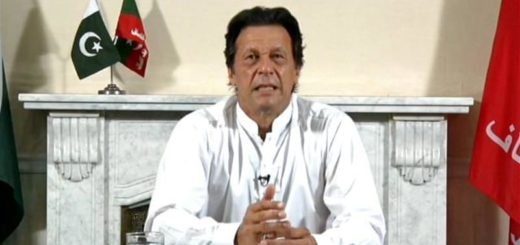Korean leaders aim for end of war, ‘complete denuclearisation’ after historic summit
The leaders of North and South Korea signed a declaration agreeing to work for the “complete denuclearization of the Korean peninsula”.
At their first summit in more than a decade, the two sides announced they would seek an agreement to establish “permanent” and “solid” peace on the peninsula.
The declaration included promises to pursue military arms reduction, cease “hostile acts,” turn their fortified border into a “peace zone,” and seek multilateral talks with other countries, such as the United States.

South Korean President Moon Jae-in and North Korean leader Kim Jong Un shake hands at the truce village of Panmunjom inside the demilitarized zone separating the two Koreas, South Korea, April 27, 2018. Korea Summit Press Pool/Pool via Reuters
“The nuclear freeze that has already been put in place by the North has a very significant meaning,” Moon said after the summit. “It will be an important step towards complete denuclearization of the Korean peninsula.”
Both sides will also seek a permanent end to the Korean War they said, 65 years after the hostilities ended in an armistice, rather than a peace treaty.
Moon and Kim also embraced warmly after signing a statement in which they declared “there will be no more war on the Korean Peninsula”.
South’s Moon will also be visiting Pyongyang later this year, both sides confirmed.
Moon’s trip will be in the autumn, a joint statement said, 11 years after his late political mentor Roh Moo-hyun went to the North’s capital for the second inter-Korean summit.
Both countries will also hold a reunion of divided families. Around 57,000 families in the South still have members in the North, one of the most emotive issues remaining from the conflict.
“South and North Korea agreed to proceed with reunion programmes for the separated families on the occasion of the National Liberation Day of Aug 15 this year,” they said in a statement, referring to Japan’s surrender at the end of World War II.
Kim promised to ensure that the agreement reached with Moon would be implemented, unlike previous pledges.
The two Koreas will closely co-ordinate to ensure they did not “repeat the unfortunate history in which past inter-Korea agreements … fizzled out after beginning,” Kim said,
“There may be backlash, hardship, and frustration on our way,” he added, “but a victory cannot be achieved without pain”.
Panmunjom, where the summit was held in the Demilitarized Zone that divides the two Koreas, was a “symbol of heart-wrenching division”, Kim said.
But if it became “a symbol of peace, the North, and South that have one blood, one language, one history and one culture, will return to becoming one, and people of all generations will enjoy prosperity”, he added.
Sources: Reuters, Agencies/zl/ng


















